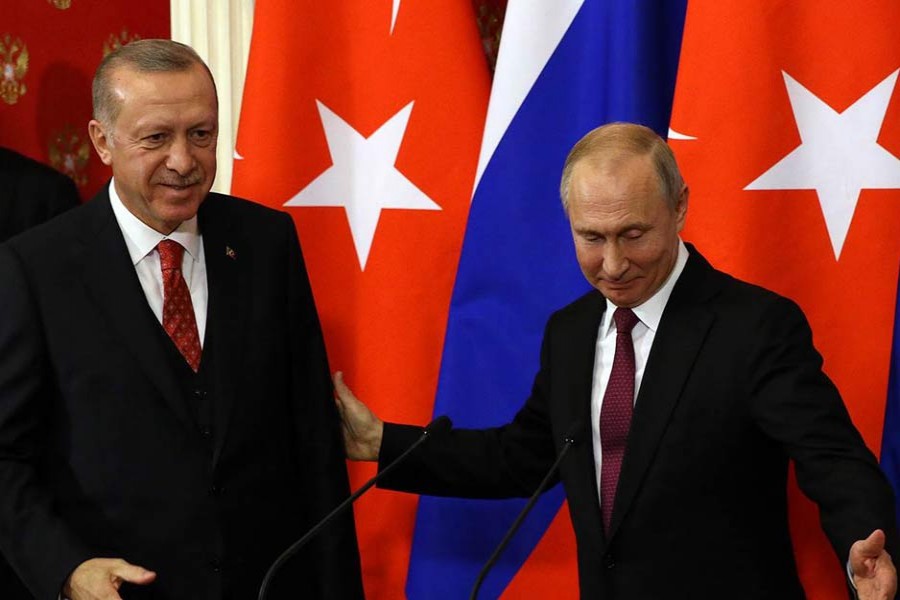As the North Atlantic Treaty Organisation (NATO) marks the 70th anniversary of its founding, it is confronting a crisis unique in its history. Turkey, a NATO member since 1952, has concluded a deal to purchase an S-400 air defence system from Russia. Should the sale go through, the future of Turkey's membership in the Alliance - and its wider ties to the West - will be called into question.
Despite warnings from the United States and NATO, Turkey seems determined to follow through with the S-400 purchase. And this, in turn, has provoked increasingly strident threats from the US. Official statements suggest that Turkey could face sanctions on multiple fronts.
For example, in March, four US senators introduced a bipartisan bill that would end Turkey's participation in the F-35 fighter jet programme if it goes through with the deal. And, given the sensitivities surrounding NATO military technologies in general, many other channels of defence procurement and cooperation between the US and Turkey could also be disrupted. In fact, Turkey's dealings with Russia could even trigger the US Countering America's Adversaries Through Sanctions Act, which would result in sanctions not just on its defence sector, but also on its fragile financial industry.
Such measures would undoubtedly aggravate the tensions that have already been building between Turkey and the US/NATO. But despite heated rhetoric from both sides, there is still time for creative solutions. In 2015, Turkey cancelled a similar deal with China for its HQ-9 missile system, and instead chose to cooperate with the Italian/French manufacturer Eurosam. So, there is nothing stopping Turkey from shelving the S-400 proposal while still pursuing other deals with Russia.
But even if a fudge can be found, it will not resolve the deeper issue. The S-400 dispute is merely the latest example of how military procurement matters have created a rift between Turkey and its Western allies. In Turkey's view, its Western partners have not done enough, through technology transfer and joint-production schemes, to accommodate its burgeoning defence industry. In contrast, Chinese and, to a lesser extent, Russian firms have been more receptive to such Turkish demands as part of the latter's military procurements.
And domestic defence-industry interests are only part of the story. More broadly, Turkey and the West are undergoing a political, strategic, and geopolitical decoupling, reflected most recently by each side's differing threat perceptions and alliances in the Syria conflict. As a regional power, Turkey is increasingly feeling a sense of status anxiety vis-à-vis the West. While its membership in NATO has become a source of constant friction, its prospects for accession to the European Union (EU) have disappeared entirely. As a result, Turkey and its Western partners have begun to question the country's place in the Western club.
Moreover, Turkey's geopolitical identity crisis has coincided with a breakdown of the Cold War security framework, which has always rested on partnership between Europe and the US. With America's commitments to allies now in question, Turkey has begun to hedge its geopolitical bets and pursue greater strategic autonomy over its foreign and security policies.
The problem is that there are no good bets on the table. With an economy roughly the size of Italy's, Russia cannot possibly replace the West as an economic and trade partner. And aside from shared discontent toward the West and military cooperation in Syria, there is little else that unites Turkey and Russia. Neither their geopolitical aspirations nor their regional alliances are compatible; each has eyed the other's territory for centuries.
Turkey may pursue a deeper partnership with Russia anyway. Since the second half of 2016, cooperation with the Kremlin has afforded Turkey a strategic advantage in Syria, where it has created its own zone of control along the western bank of the Euphrates River. But now that the S-400 issue is coming to a head, what was previously a strategic advantage is quickly becoming a liability.
At this point, Turkey has no cost-free options. As its insistence on following through with the S-400 deal shows, its engagement with Russia has already created path dependencies, which will harden further if the US and other NATO member states introduce sanctions.
Like its attempt to reconcile NATO membership with its own search for strategic autonomy, Turkey's balancing act between different centres of power is unsustainable. Sooner or later, Turkey will end up stuck between its erstwhile allies and its fragile new partnerships. When that happens, it will not be able to count on either.
Galip Dalay is a visiting scholar at the University of Oxford and a former IPC-Mercator Fellow at the German Institute for International and Security Affairs (SWP).
Copyright: Project Syndicate, 2019.
www.project-syndicate.org


